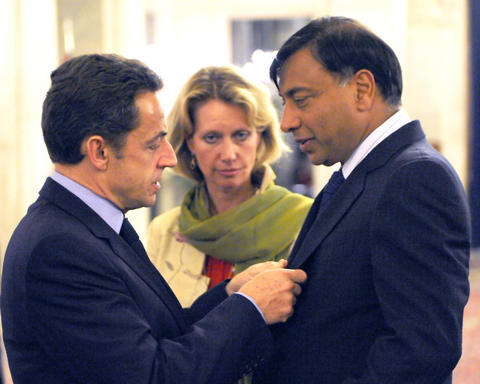The number of billionaires in Asia jumped more than 30 percent last year, with tycoons from India and China leading the charge, according to Forbes magazine's annual billionaires list.
In total, this year saw 1,125 people around the world making the list, up from 946 last year, representing a total net worth of US$4.4 trillion and a dramatic increase from US$3.5 trillion last year.
"This past year was an amazing one around the world in terms of the global economy and it's reflected on this list," Forbes said, adding that the number of billionaires had almost doubled in the past four years.

PHOTO: AP
"The reason for this explosion in wealth is that we're in the midst of a phenomenal global boom," the magazine said.
US financier Warren Buffett has overtaken Bill Gates as the world's richest man, according to the list.
Buffett, the 77-year-old chief of the Berkshire Hathaway holding company, saw his wealth jump from US$52 billion last year to US$62 billion, pushing Microsoft co-founder Gates into third position after 13 years at the top.
Mexico's telecom mogul Carlos Slim Helu grabbed second place with a tidy nest egg of US$60 billion, up from US$49 billion last year.
221 in Asia
Asians accounted for 211 people on the list, up from 160 last year, with India counting 53, up from 36 last year, and China, which had just 20 billionaires last year, now boasting 42.
Hong Kong saw five more entrepreneurs make the grade, giving it a total of 26 and meaning that China and Hong Kong, which has a special administrative status under Beijing, lead the Asian list if grouped together.
Japan, which last year lost Asia's leading spot after 20 years at the top, by contrast counted only 24 tycoons on the list, unchanged from last year and down from 27 in 2006.
"We see some trends that show that [China's] maybe several years or a decade behind the United States. We have a handful of Internet folks for the first time," senior Forbes editor Luisa Kroll said, unveiling the findings.
"A lot of the fortunes in China and Asia in general are in real estate and infrastructure development as the booming economies basically build up to handle all of the growth," she said.
India placed third in the world for the number of billionaires, trailing the US, which easily led the rankings with 469 billionaires up from 415 last year, and Russia with 87.
Lakshmi Mittal
Four Indians figured in the top 10, with steel giant Lakshmi Mittal placed fourth with US$45 billion, followed by petrochemicals tycoon Mukesh Ambani with US$43 billion and his estranged brother Anil Ambani on US$42 billion.
Property magnate K.P. Singh came in eighth on the list, with a fortune estimated at US$30 billion.
Hong Kong businessman Li Ka-shing (
Twenty-six-year-old Yang inherited her US$7.4-billion wealth when her father transferred his shares in the Country Garden Holdings property company he founded into his daughter's name.
Elsewhere, Australia counted the most billionaires in the Asia-Pacific region with 14, followed by South Korea with 12 and Malaysia with eight.
Taiwan had seven, including Tsai Hong-tu (

The CIA has a message for Chinese government officials worried about their place in Chinese President Xi Jinping’s (習近平) government: Come work with us. The agency released two Mandarin-language videos on social media on Thursday inviting disgruntled officials to contact the CIA. The recruitment videos posted on YouTube and X racked up more than 5 million views combined in their first day. The outreach comes as CIA Director John Ratcliffe has vowed to boost the agency’s use of intelligence from human sources and its focus on China, which has recently targeted US officials with its own espionage operations. The videos are “aimed at

STEADFAST FRIEND: The bills encourage increased Taiwan-US engagement and address China’s distortion of UN Resolution 2758 to isolate Taiwan internationally The Presidential Office yesterday thanked the US House of Representatives for unanimously passing two Taiwan-related bills highlighting its solid support for Taiwan’s democracy and global participation, and for deepening bilateral relations. One of the bills, the Taiwan Assurance Implementation Act, requires the US Department of State to periodically review its guidelines for engagement with Taiwan, and report to the US Congress on the guidelines and plans to lift self-imposed limitations on US-Taiwan engagement. The other bill is the Taiwan International Solidarity Act, which clarifies that UN Resolution 2758 does not address the issue of the representation of Taiwan or its people in

US Indo-Pacific Commander Admiral Samuel Paparo on Friday expressed concern over the rate at which China is diversifying its military exercises, the Financial Times (FT) reported on Saturday. “The rates of change on the depth and breadth of their exercises is the one non-linear effect that I’ve seen in the last year that wakes me up at night or keeps me up at night,” Paparo was quoted by FT as saying while attending the annual Sedona Forum at the McCain Institute in Arizona. Paparo also expressed concern over the speed with which China was expanding its military. While the US

SHIFT: Taiwan’s better-than-expected first-quarter GDP and signs of weakness in the US have driven global capital back to emerging markets, the central bank head said The central bank yesterday blamed market speculation for the steep rise in the local currency, and urged exporters and financial institutions to stay calm and stop panic sell-offs to avoid hurting their own profitability. The nation’s top monetary policymaker said that it would step in, if necessary, to maintain order and stability in the foreign exchange market. The remarks came as the NT dollar yesterday closed up NT$0.919 to NT$30.145 against the US dollar in Taipei trading, after rising as high as NT$29.59 in intraday trading. The local currency has surged 5.85 percent against the greenback over the past two sessions, central